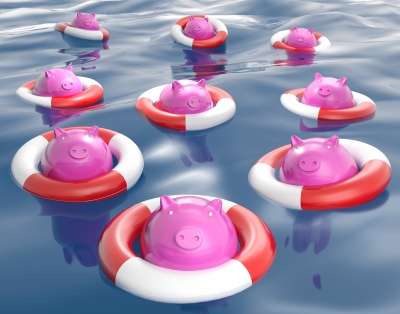The economic climate is still precarious. Looking at Greece’s economic turmoil, and the Government Shutdown in the US, there is plenty to be wary about when it comes to hanging on to your money. Even as some economies begin to grow, there are many that are balancing between negative and positive growth. So how can you, as an individual, protect your finances from Cyprus style 60% bail-in levies and the like? Here are our tips to help you ensure that your money is kept safe.
Diversify Your Assets

Savings
You should have enough money saved to float you for three to six months in case of job loss. This means that you don’t have to worry about money for this period of time while you find work. You should also have enough cash on hand to carry you though a power outage or bank closure. It’s the bare bones expenditure that you need to look at here, what’s the least you can afford to spend on food, shelter, utilities?
Credit
Applying for more credit, while you’re not in desperate need of it is always a good idea. Don’t go for pay day loans; instead opt for credit cards with an introductory 0% interest rate or cash back. Make sure that you look at the benefits that you get with the card, and spend wisely – only use it when absolutely necessary.
Consolidate Loans
Economists are predicting that the interest rates on loans will go up in the case of a U.S. default. Variable rate loans are much more dangerous in these volatile times, as a small increase in the interest rate can result in a drastic increase in your monthly payments. Locking in current low rates by consolidating any variable interest rate loans into one fixed rate loan is by far the most sensible thing to do.
Talk to Your Bank
If you think that you’re in trouble and you’re going to struggle paying off your debts, then it’s worth talking to your bank and seeing if you can reduce repayments, adjusting due dates or waiving withdrawal penalties.
Get a Bespoke Plan
Talking to a Wealth Manager, will help you see where you can reduce spending, or make more out of your savings. A wealth manager can help you plan ahead and take control of your money. No longer just for the uber rich, a wealth manager can really help you create a financially stable future with a plan that is created just for you.
While you can never be completely crisis-proof, these tips will help you take a step toward being financially safe.
See Also:
- 3 Reasons to Protect Your Family With Life Insurance
- Internet Safety: Protect Yourself Online
- 5 Ways To Protect and Grow Your Retirement: Whether You’re 45 or 75 or Somewhere In Between
- How to Protect Yourself During a Deflation
- Preparing Your Finances for 2012 (still applicable for 2013 and beyond)
Resources
Image courtesy of Stuart Miles / FreeDigitalPhotos.net

